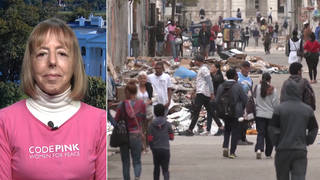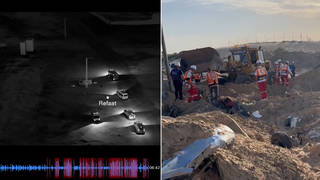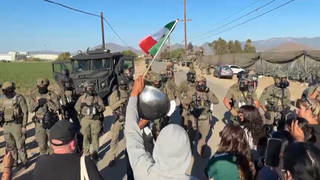
The Trump administration’s mass deportation machine continues to shatter families and communities with violent, indiscriminate raids on schools, homes and workplaces. Farms are a particular target of its brutal, racist crackdown; around two-thirds of U.S. farmworkers are immigrants, largely from Mexico. Earlier this month, a raid on a farm in California turned fatal when 57-year-old Jaime Alanís died after falling from the roof of a greenhouse. Dozens of his fellow workers were rounded up and loaded onto buses destined for a detention center. Many of the targeted farmworkers are members of the United Farm Workers, the nation’s oldest farmworkers’ union. Its president, Teresa Romero, a longtime labor leader who is the first Latina and first immigrant to head the organization, says “farmworkers are terrified.” She says that “replacing people who are experienced, who are professional, who have been in agriculture, working sometimes for decades, [is] not how we should repay them for the sacrifice and hard work,” and adds that “sooner or later, the agriculture industry is going to suffer.”
Transcript
AMY GOODMAN: This is Democracy Now!, democracynow.org. I’m Amy Goodman, with Juan González.
We end today’s show in California, where a farmworker who fell from the roof of a greenhouse during an immigration raid last week died over the weekend. His name, Jaime Alanís, 57 years old. He had worked at the farm in Camarillo for 10 years and provided for his wife and daughter who live in Mexico. His niece says he will now be laid to rest in his hometown of Michoacán. The raid Thursday led to an hourslong confrontation between protesters defending the workers and federal border agents, who tear-gassed crowds which included children. Alanís is the first known person to die in an immigration raid as part of Trump’s crackdown. A fundraising campaign for his family has raised more than $150,000. More than 360 people were arrested that day in dual raids, both in Camarillo and the coastal city of Carpinteria. As raids terrorize immigrant communities, people are also organizing and fighting back.
We’re joined now in Kern County, California, by Teresa Romero, longtime labor leader, first immigrant Latina president of United Farm Workers of America.
Welcome back to Democracy Now!, Teresa. It’s wonderful to have you with us. If you can talk about this moment in history? We don’t know how many hundreds, if not thousands, of farmworkers have been detained — as many people say, kidnapped. If you can tell us what the situation is, now President Trump pulling back 2,000 National Guard in Los Angeles but leaving 2,000 there, not to mention somewhere around 700 Marines? If you can tell us what the situation is and how you’re organizing?
TERESA ROMERO: Thank you very much for having me, Amy. I really appreciate it. This is such an important issue.
Farmworkers in our communities are terrified. We have families who are being destroyed. Like you said, Jaime Alanís García died as a result of these raids. And we need to understand that I have been using this word “kidnapping” for a long time, because people are showing up, are wearing masks. They don’t have an identification that they’re showing to the workers. They are — they have unmarked vehicles. They were there in great numbers. And if they had had a search warrant or an arrest warrant, all they needed to do was knock on the door, and we’d let them in, and they would have been arrested, the person they were looking for. Unfortunately, the way they did it was to intimidate people, to intimidate farmworkers. And it worked. Farmworkers are terrified right now.
JUAN GONZÁLEZ: And what is happening in terms of the agricultural industry as a whole, with these raids and with workers even being able to show up in the fields?
TERESA ROMERO: You know, Juan, what happens is, when something like this occurs in their communities, they may not go to work for a day or two, maybe three. We need to remember that farmworkers do not make a lot of money. A lot of them are seasonal workers, so they cannot afford just to not go to work. They have a family to support. Right now that’s pretty much all they do, go to work and come home. And every time they leave their homes, they’re terrified, not knowing if they’re going to come back. And their children, who in many cases are U.S. citizens, are terrified to go to school, because they don’t know if mom and dad are going to be home when they get back.
JUAN GONZÁLEZ: And the Trump administration seems to be just reacting to the agribusiness industry’s economic concerns, but the farmworkers are being left out of any discussions here as to possible next steps by the administration in handling farm labor. Could you talk about what your union would like to see?
TERESA ROMERO: Of course. And for many years, for decades, farmworkers have not had a seat at the table. The previous administration, thankfully so, we did, but it’s going back to where farmworkers’ voices are not heard.
What they’re trying to do right now is deport and replace. They want to deport farmworkers who have been working in the fields, putting food on our tables for decades, and want to replace them with workers who come here with the H-2A visa program. These farmworkers are even more vulnerable, because they’re under — 100% under the control of the employer. So, this is not the answer. Replacing people who are experienced, who are professional, who have been in agriculture, working sometimes for decades, three, four decades, it is not how we should repay them for their sacrifice and hard work.
AMY GOODMAN: I want to turn to Flor, a Mexican immigrant who picks strawberries in the agricultural town of Oxnard, California. Yesterday, we interviewed the mayor of Oxnard. She says the recent immigration raids have terrorized her community. She talks about her work.
FLOR: [translated] Yes, lately, it’s been very ugly at our job site, because we are working, and the immigration cars are passing by. It has affected us a lot at work. We have lost days without going to work. We have been stressed out, afraid to go out to work in the mornings, with fear of not knowing if we’re going to get home or not. … Well, I’m more afraid because I’m a single mother, and I have three children who depend on me. And it breaks my heart that every time I leave the house, they tell me, “Mommy, be careful, because they can take you and send you to Mexico, and we’re going to stay here without you.”
AMY GOODMAN: That’s Flor, a farmworker in Oxnard. She says she’s paid $3.20 for a 20-pound box of strawberries. Can you talk about the conditions and the economics of being a farmworker, and then talk about children?
TERESA ROMERO: You know, the conditions in the fields are very difficult. In California, there are areas where the temperatures can get to 120, 150 degrees. And the workers are toiling the fields, no matter what. They are bending over. They are picking whatever crop they’re picking. They run — for example, tomatoes. They run to a truck to dump the buckets, and they run back again and do it all over again. This is something that is — it’s dangerous. Workers have died because of heat illness.
We have fought very hard right now, and we have filed lawsuits, to prevent the administration and ICE from detaining people just because of the work that they’re doing, the language that they speak, the color of their skin. And the judge agreed with us. The judge gave us a temporary restraining order. Of course, the administration is saying that they’re going to deport it — I mean, I’m sorry, they’re going to fight it. But it is just unfair that good, hard-working people are being targeted like this. They are not criminals. They’re not criminals. And sooner or later, the agriculture industry is going to suffer.
When it comes to families, you know, like I said earlier, farmworkers are going to work and coming back home. They don’t go out to the park with the kids. They don’t go to school functions with the kids. They don’t take the kids on the weekend for a hamburger. It is affecting themselves, their family and their communities to a great extent.
JUAN GONZÁLEZ: I wanted to ask you, Teresa — there are some farmworker advocacy groups, for instance, like the group Somos Poder del Pueblo, We Are the Power of the People, that are calling for a more militant response, possibly a nationwide strike of farmworkers, in response to Trump’s attacks, and they’ve circled the dates of July 16th to the 18th. What is the United Farm Workers’ view of this kind of action at this point?
TERESA ROMERO: [inaudible] involved in this action. Look, we empower workers to do what they think it is the best thing to do to protect their rights. We know from experience — and you know our history — that a strike takes a lot of discipline, a lot of work and engagement, a lot of commitment and a lot of time to plan and organize. So, although I see — we see what they’re doing, this is not something that we’re involved. If we ever get to a point where we’re going to do that, it would take a lot of planning, looking at the pros and cons under the circumstances. So, all I’m asking is, whoever is going to be out there, to just be careful. We don’t want these people that are fighting for others to be retaliated against and detained by ICE.
AMY GOODMAN: Teresa Romero, we want to thank you for being with us, longtime labor leader, president of the United Farm Workers. I’m Amy Goodman, with Juan González.












Media Options